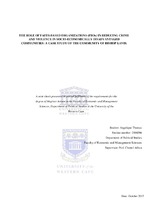| dc.description.abstract | Out of a personal conviction that having been surrounded by crime and violence for many years
was abnormal, this study was born out of a desire for the researcher to understand whether
alternative solutions were available that could exist to reduce crime and violence in her own
community. While crime rates and violent acts were rising, she considered why the personal
religious beliefs of many did not motivate them to consider resisting the violent acts that had
so often clashed with their own faith practices.
For centuries resisting violence has been a natural reaction across the globe. Historical battles
and legendary wars have, for years, been an example of the way in which states have come up
against one another and how various organizations have taken up arms in their efforts to restore
order. Similarly, gang violence in nations across the world has become a normality. This is no
different in South Africa. With the large assemblage of faith communities within South Africa
it is necessary to understand what the role of the faith community is in reducing crime and
violence in socio-economically disadvantaged communities.
By using qualitative methods of observations, interviews and focus group discussions it was
found that the main barrier to FBOs fulfilling their partial role of responding to the extreme
acts of violence is fear. While they may fulfil their role by responding through general religious
activities and responding in voluntary forms in addressing socio-economic issues, FBOs within
Bishop Lavis fail to fulfil their role as active agents of change in the face of the violence that
is present within the community. This, the researcher then argues, may be some of the very
challenges experienced by other FBOs in other areas on the Cape Flats given the responses by
the research participants and the common trials and features of the case study in Bishop Lavis. | |

